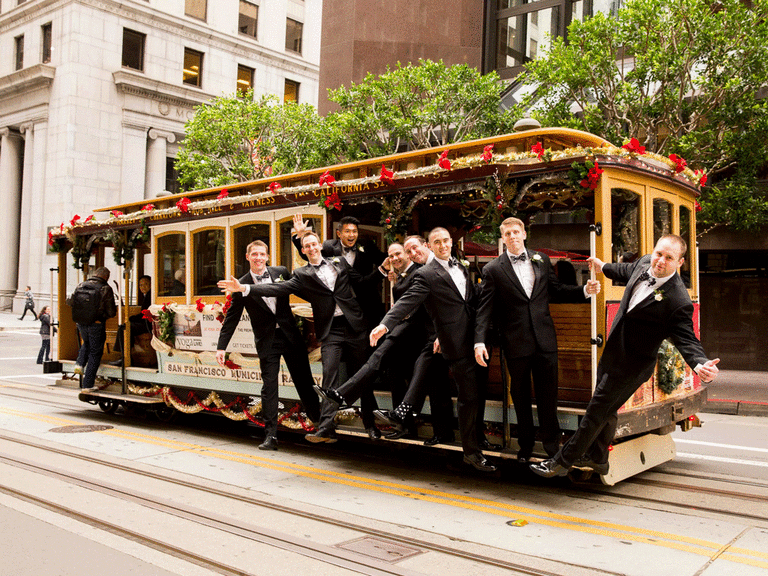Expert Wedding Transportation Tips So You Can Have a Smooth Ride
Like "Chapel of Love," by The Dixie Cups says, "We're goin' to the chapel / And we're gonna get married." But how's your mom getting there? Or your wedding party? Figuring out your wedding transportation is vital because not only does it help you get to your wedding, but it can ensure all your guests arrive at your wedding on time. According to The Knot Real Weddings Study, a survey of nearly 12,000 couples, 35% of couples booked wedding transportation for their big day. To help you figure out the traveling logistics, we break down everything you need to consider, from when you should book to who pays for the wedding bus.
In this article:
- Who Needs Wedding Transportation?
- When You Need Wedding Transportation
- When Should I Book my Transportation?
- How Much Does Wedding Transportation Cost?
- Other Things to Consider for Your Wedding Transportation Plan
Who Needs Wedding Transportation?
Michelle Norwood, the principal designer and planner of Michelle Norwood Events, says your wedding party and VIPs are the number one people that need wedding transportation. "For VIPs and wedding party [members], it's best to keep all of these people together, so people aren't all over the place. Pre-ceremony transportation is a must, in my opinion." You'll need to take a headcount of this group so you can determine what kind of vehicle you'll need to book. For many weddings, that means the couple, their wedding party, parents, siblings not in the wedding party and grandparents. Some couples also provide wedding transportation services for close relatives, out-of-towners and all guests.
When You Need Wedding Transportation
So where do you draw the line with transportation for your wedding? The decision will probably come down to your wedding budget, but you should also consider the following:
-
Distance: If your ceremony and reception venues are only a short distance away from each other, you're in the clear. But there's a cutoff—if they're more than 30 minutes apart, you should consider providing transportation for all wedding guests so you don't inconvenience them with rideshare charges or long, tedious drives. Keep other distances, like the miles between your wedding venue(s) and the hotel where you've booked room blocks, in mind too.
Location: If you have lots of people coming in from out of town (who might not have cars with them), a hard-to-get-to or hard-to-find location, you should also consider booking transportation for guests.
-
Special needs: Make your wedding disability-friendly by thinking about anyone who might struggle to transport themselves. Organize a travel plan for them—for example, ask a loved one to pick up your 90-year-old grandma who isn't comfortable behind the wheel.
Even if you don't have room in your budget to book transportation for guests, there are ways you can still help them. In your invitation suite or on your wedding website, provide information about public transportation. This can include where to catch a cab, phone numbers of (reputable) local services and estimates of how much each option will cost. That way, no one will have to worry whether they have enough cash on them. Wedding transportation etiquette is a little different if you're having a destination wedding. "Keep in mind that if you're hosting a destination wedding, guests have flown from near and far to attend your event. Providing transportation is the least you can do," Norwood says.
Another thoughtful alternative to booking transportation is providing discount codes for rental cars. (Psst. Wedding guests get up to 25% off if they book a Budget rental car through The Knot.) Also, check with the hotels you've reserved rooms at to see whether they provide airport shuttle service; if they do, inform your guests, then cross another task off your list.
When Should I Book my Transportation?
Once you've finalized your guest headcount for the vehicles, you'll need to make a wedding transportation plan so everything can go without a hitch. When there are three to six months to go before your special day, it's time to book your transportation––when you've settled on your date, ceremony and reception sites. If you're marrying in April, May or June—prom and graduation season—high-class vehicles will be in high demand, so you'll need to book your transportation even earlier.
The Knot Expert Tip: Make the final reservation in person so you can inspect the vehicles and ask which one(s) you'll be getting.
Think about what type of vehicle you want, which you can base on your wedding theme or location. Having a nautical-themed wedding overlooking the water? Transport your wedding guests to the ceremony venue via sailboat. Planning a romantic wedding in San Franciso, California? Rent a classic trolley for your guests to get to and fro. But putting the fun ideas aside, your wedding location can impact the size of your vehicle. "For example, in New Orleans, the streets are quite tight and larger buses can't make certain turns," Norwood explains. Research the transportation needs and requirements for the city and venue your wedding is taking place, before booking your ride.
Wedding transportation vendors by city and state: Atlanta | Austin | Baltimore | Cape Cod | Chicago | Columbus | Connecticut | Dallas | Dayton | Houston | Kansas City | Los Angeles | New Jersey | New Orleans | Orlando | Philadelphia | San Diego | San Jose | Virginia | Washington DC | Wilmington
When should I schedule the pick up and drop off times?
To estimate an ideal pick up time for the ride to the ceremony, for example, plan to arrive 15 minutes early, then work backward: ceremony time, minus 15 minutes (or even more if you're planning to get ready at the site), minus drive time, minus 10 to 20 minutes of "padding" for traffic, unexpected delays and getting excited people into multiple cars.
If your ceremony and reception are at separate locations, don't forget about timing transportation between them. If your exchange of vows ends at 4:30 p.m. and the reception location is only 15 minutes away, but cocktail hour doesn't begin until 6 p.m., you risk having guests arrive while the space is being prepared. Timing is everything, so try to schedule sensibly. If that's not possible, you may need to devise a plan for occupying guests in the interim or, if need be, discuss with your reception site manager the possibility of starting the cocktail hour earlier.
Does my wedding venue need parking?
Some guests will be shuttling themselves around, so keep parking in mind. Talk to the reception site manager and find out your options and who handles the arrangements. If you have to hire an independent service, tailor it to your needs. You can choose a full-service valet team, which will park your guests' cars and retrieve them at the end of the night. Or opt for parking attendants who direct traffic, hold signs and guide drivers to empty spaces. Either way, expect to pay an hourly rate per person, plus a 15 to 20% tip usually tacked on to your total bill. (Here's a wedding vendor tipping cheat sheet.) We suggest hiring five valets or three to four parking attendants for every 100 guests.
The Knot Expert Tip: A massive guest list, limited parking facilities and a complicated location will require more help and add to the cost. Before getting a price quote, ensure the parking service manager checks out the location to see how many attendants you'll need.
How Much Does Wedding Transportation Cost?
According to The Knot Real Weddings Study, the average cost of wedding transportation is $980. That said, pricing varies based on when, where and what you book. Once you've established your needs, start inquiring about rates and availability in your area. Most rental companies charge by the hour and require a minimum time of typically three hours. Calculate the duration from the pickup time to the end of the reception to determine if it's worth it for your wheels to wait. A 15% to 20% tip is usually included in the contract, but if not, a $20 tip for each driver is appropriate.
Who pays for the wedding transportation?
Traditionally, it's the bride's family's responsibility to pay for organized transportation and parking, minus the expense of getting the groom and best man to the ceremony (the groom's folks traditionally pick up the tab). The bride also foots the bill for getting the wedding party and family members around. Today, however, it's entirely up to you, your partner (and your wedding budget) who pays for what.
If guests are left to their own devices, they're responsible for their transportation costs, whether that involves filling their gas tank, renting a car or getting a cab.
How can I save money on wedding guest transportation?
A couple of ways you can save money on transportation is by shopping around for good deals at various places (one reason why starting early is helpful) or asking rental companies if they can add freebies or extras as a part of your wedding package. The most cost-effective transport (if you're having a small wedding) is to recruit locals to carpool with the out-of-towners. Sorting out how to get everyone from point A to point B may become an unruly task if there are a lot of people to pair up from multiple origin points. If it's too unwieldy to pull together a volunteer fleet, rent––don't stress yourself out too much before the big day. Skip the stretch limos and go with the regular size, or even downsize to a town car if you can. Leave out amenities like an onboard bar, TV and sunroof. Surprisingly, even the color of the car you choose can cut your bill. In general, you'll pay less for black or silver limos than white ones, particularly during the wedding season.
Other Things to Consider for Your Wedding Transportation Plan
Create a call sheet with the names of guests and all pickup and drop-off addresses and times. Then call to confirm these arrangements with the car company the day before and the morning of the wedding. We recommend choosing a transportation point person (be it your wedding planner, a close friend or a family member) to oversee logistics on the wedding day and handle any issues. Read below for more transportation aspects to keep in mind.
Overcrowding: Billowing skirts and nervous excitement call for more space. Don't try to fill every car to capacity to save money––allow an extra person's worth for breathing room.
Drivers without GPS: Drivers should have all this information in advance, including (hard copy, in case of bad cell service or no GPS) detailed directions to the ceremony and reception sites. It's also a good idea to give passengers a copy of the directions with an emergency contact number in case the driver gets lost.
Planning routes ahead of time: Try taking at least two different routes to your wedding venue(s) around the day and time you'll be having the event so you can get estimated arrival times. For example, if your wedding is supposed to be on a Saturday at 3 p.m., drive to your wedding venue on a Saturday at 3 p.m. to get a ballpark for what to expect on your wedding day. If you can't do this task yourself, ask your wedding planner or a loved one if they're able to do it for you.
Your transportation contract: Be sure to get all the details in writing with your rental company. Here are a few of the points that should be included: date, time, locations of pickup and drop-off points, type and the number of vehicles rented and the exact hours each vehicle is booked for.





















